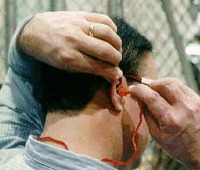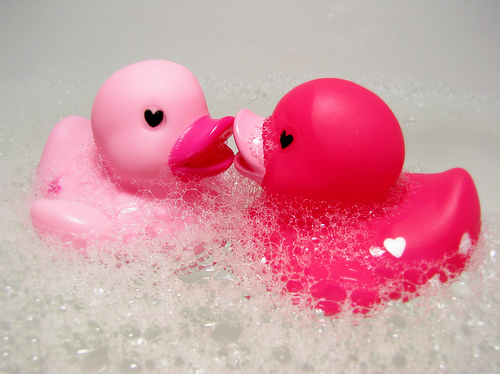Making Friends Online
I’ve been online a very long time. Since the late 80’s. That’s before what we currently know as the net was much more than a twinkling in a small handful of San Francisco computers.
So, I’ve had a lot of time to think about the intricacies & common pitfalls of meeting someone online.
The first thing to do is let go of the idea that there’s anything particularly special about “meeting someone on the net.”
The internet is just a way of communicating. It’s no different from meeting someone face to face, via the telephone (don’t laugh, I ended up dating someone for years that I first talked to over the phone), or even really old school – by writing, aka pen pals. The only difference is the bandwidth of the medium.
The Importance Of Bandwidth
What do I mean by bandwidth? Simply put, how much information is transmitted while you’re communicating.
How do you figure that out? Just think about how much you can tell someone and then how much delay there is during that conversation.
If I can only type one word at a time and there’s ten minute delay between words, that’s not a lot of bandwidth. Compare that with being face-to-face, being able to see, hear, touch someone. That’s super high bandwith.
In terms of bandwidth, there’s a definite hierarchy:
- Twitter/SMS (140/160 chars at a time, slow back-and-forth)
- IRC/IM (short message, but less delay)
- Email (can go into much more depth, nested conversations etc)
- Voice
- Skype (video)
- Face-to-face
& once you’re face-to-face of course, there’s a further hierarchy.
- Formal situation (eg work place).
- Informal, but physically distant.
- Informal, but physically close (within a foot or two)
- Naked, close
- Naked, touching
- Energetically entwined/internal
The key with physical distance is – the space around us is not empty. There’s information there. This is one reason you can feel if someone is standing “too close” to you, or why you feel uncomfortable. It’s not just about the physical, it’s their energy interacting & interfering with ours.
So why is this even relevant? Because all human interaction is about communication, & the higher the bandwidth, the better the communication.
The critical point here: When getting to know someone, more bandwidth is better.
How We Make Friends
Making friends is a pretty straight forward process. This is similar regardless of the depth of the relationship we’re building towards (acquaintenances, buddies, friends, emotional support network, intimate partners). The only difference is how far we take the process, & the level of discrimination we apply.
- Similar interests? (easy to determine, low invasiveness)
- Similar world view? (takes more time, but critical for mutual approval & understanding)
- Do we like them? (although it is possible to be friends, eg with people we dislike but respect, it is harder)
- Do we trust them? (this’ll determine how much deeper we let the relationship go)
With low grade friendships (eg guys we hang out & watch football with) we typically only need to go as far as stage 1. With a healthy intimate partner, we’d need to go all the way to level 4.
Once we’re ok at one level, we can choose to investigate the next.
Of course, there is a lot more complexity here, I’m simplifying for the sake of clarity.
How Do We Get To Know Someone?
Fundamentally, we progress through the above process in direct proportion to how much bandwidth (ie, information) has been shared between us.
Spend a week in close proximity to someone, you’ll get to know them a lot faster than a week spent texting. This is why you can spend years getting to know someone at a distance, but the relationship really doesn’t start in earnest until you’re both in the same physical space.
So if you want to get to know someone, become friends with them, the trick is simple: Increase the bandwith as quickly and as much as possible.
The longer we spend at the low bandwidth end of things (twitter, sms, facebook etc) the more likely we are to fundamentally misunderstand or misjudge someone we might otherwise become excellent friends with.
If we want to build a quality relationship with someone, we need information before we can make a qualitative judgement. This is the “I thought you were awesome, but you’re actually a complete dick!” problem.
If we want to know how far or how deep to take the relationship, we need information. This is the “You looked hot with the lights out, but now they’re on.. ARGH!” problem.
If we want to know whether to trust someone, we need information. This is the “I told you my secret, but you blabbed it to everyone!” problem.
How do we get the information we need? By communicating, of course – regardless of the medium (telephone, text, email, voice, face-to-face). The more communicating you do, the better you’ll know someone. The higher the bandwidth you’re able to achieve between each other, the more you can communicate.
Really, getting to know someone on the internet is exactly the same as getting to know someone off – except you have significantly more varieties & amounts of bandwidth to communicate over. It’s still not as great as spending time face-to-face, but it does enable the chance to get to know someone even if you’re not able to regularly spend time in the same physical space.
Some Advanced Tips
Communicating over the net has some surprising benefits that face to face doesn’t. Often people will tell you far more by what they don’t say than what they do.
- If someone regularly doesn’t respond to certain types of conversation – this is usually a sign they’re avoiding something. This sounds obvious, but it’s very easy for messages to fall through the cracks. It’s worth paying attention to whether the other person is just sloppy replying in general, or whether it’s always the same subject. Is it taboo in their culture/upbringing, are they shy, or is this going to be a point of contention in trying to progress the relationship any further?
- Are you both putting in similar amounts of effort? If one of you is initiating contact a lot more, or writing in more detail & only receiving off-the-cuff responses, a reasonable interpretation would be “they’re just not that into you”.
- Do you communicate at a similar level? Differences in grammar or spelling are obvious, but if one of you is only interested in talking about football, but the other would prefer to discuss the philosophical motivations that encourage societies to perpetuate acceptable proxies for inter-tribal violence, this difference may be worth paying attention to.
- Is communication frequency similar? Some people are happy emailing or texting once a day, or once every few weeks. Some prefer longer missives. Some prefer short bursts but more often. If there’s a mismatch, that can spell difficulties down the line. Communication is difficult enough, without the added frustration of feeling that someone is always down your throat, or never responds when you try to connect with them.
- Does the person show as much interest in you, your family, the things you care about, as you do in them?
- Are you genuinely excited to hear from them? If not, that may be telling you you’d be better off spending your time and energy on someone who does.
None of these things are foolproof, of course, any more than body language is an exact science. However, if you look at them together, they will typically tell you far, far faster than you would otherwise know whether someone is worth pursuing any kind of friendship with. This, of course, then frees you up to spend your time & energy on those who are excited to see you, will love you as deeply as you love them, & where you will both enrich each others lives.
Communicating over the net is no substitute for time spent in each others presence, but it truly is a wonderful way to meet & get to know people faster & more effectively than ever before.



